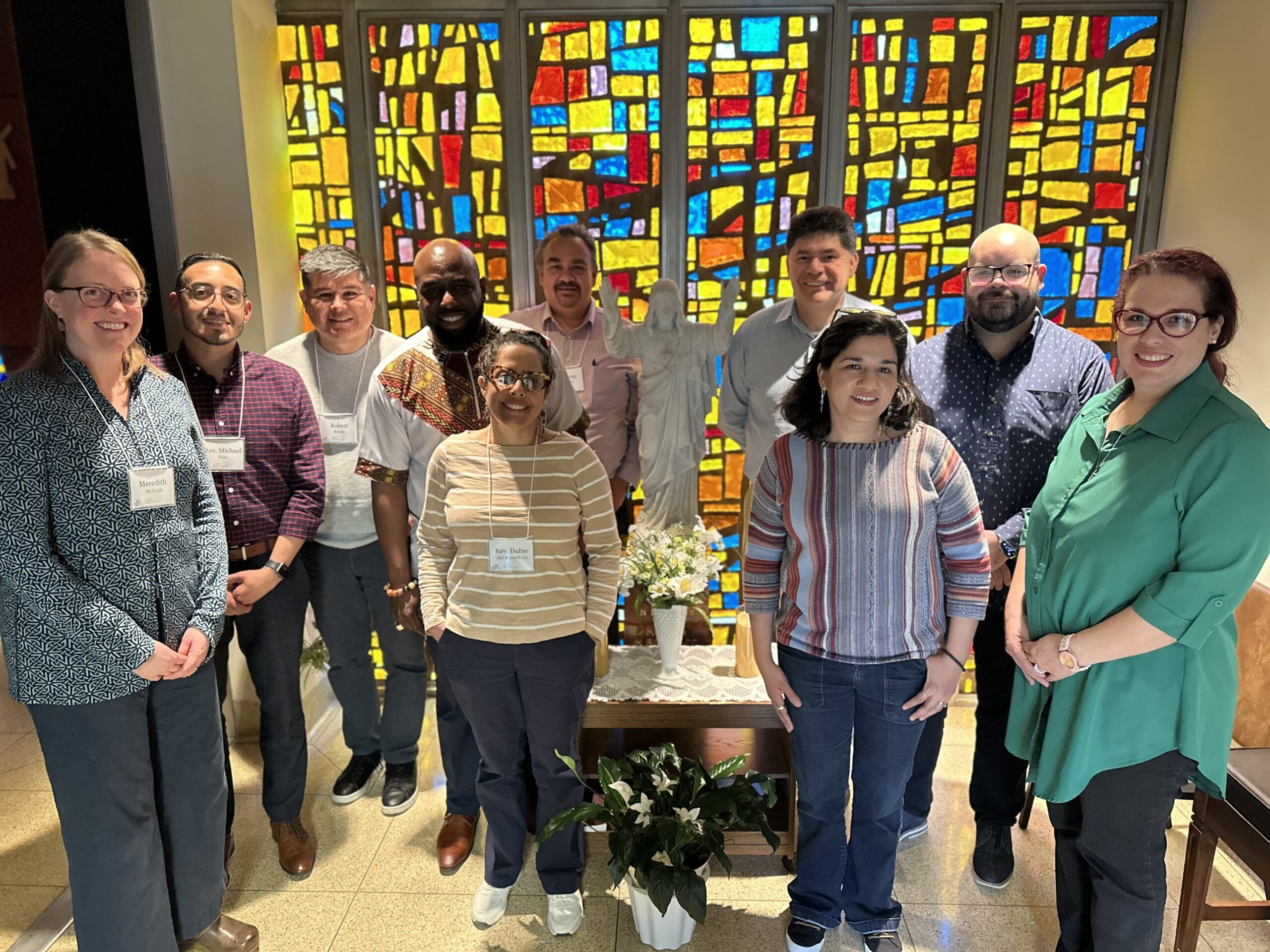Nurturing Generosity within Hispanic/Latinx Communities
Nurturing Generosity within Hispanic/Latinx Communities
By Dr. Carlos W. Perkins, Associate Director of Engagement, Lake Institute

In the realm of religious and philanthropic studies, the intersection of faith and generosity has long been a subject of deep concern and contemplation. Twenty-five years ago, in Financing American Religion, Mark Chaves and Sharon Miller observed, “Money always has been a subject of deep concern for religious leaders. In recent decades, however, this perennial concern has taken on a new urgency as a crisis perceived” (Pressley and Collier, 1999).
This observation may be even more true today, underscoring a critical tension for religious communities as they navigate the complexities of financial sustainability amidst moral imperatives. Within this broader context, the Hispanic/Latinx faith community presents a unique and dynamic landscape, where cultural, familial, and religious values intersect in powerful ways to shape philanthropic behaviors.
Recent research provides a nuanced understanding of these dynamics. For instance, the 2023 report Latinx Philanthropy: Understanding Generosity Trends Across Latinx Communities in the U.S shows us that themes of faith, family, and community not only motivate current giving but also define the changes many Latinx donors hope to see as philanthropy—and their role in it—evolves.
This dual focus on the present and future speaks to a community deeply engaged with its cultural heritage and simultaneously looking ahead to new paradigms of giving. The unique contributions of Latinx donors, both high net worth as well as everyday givers, often involve informal giving practices and a strong emphasis on family and intergenerational involvement. These distinctive patterns of philanthropy present both opportunities and challenges for those seeking to nurture generosity within Hispanic communities.
A Focused Conversation
In April 2024, Lake Institute gathered scholars, researchers, and practitioners to focus on the theme of nurturing generosity within Hispanic/Latinx faith communities and to explore these complex interconnections. The gathering provided a platform for sharing insights, strategies, and best practices aimed at fostering a culture of giving that resonates with the values and traditions of the Latinx community.
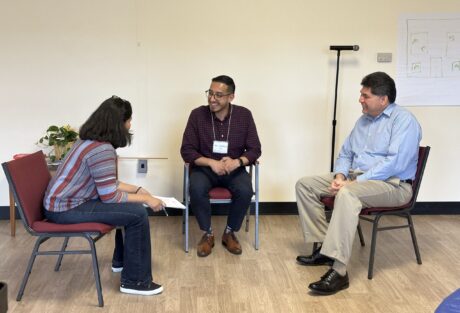
Our full report presents the key themes that emerged, with extensive quotes from participants. Here, we want to emphasize our top-line findings, along with potential directions for collaboration going forward.
Diversity of Perspectives
Participants emphasized the importance of understanding the specific cultural contexts and religious beliefs that inform philanthropic behaviors. They also highlighted the need for inclusive approaches that recognize the diverse expressions of generosity within Hispanic/Latinx faith communities.
Overall, the event provided a rich tapestry of reflections and insights, underscoring the complexity and diversity of perspectives within the Latinx community. The following key reflections emerged:
The Role of Cultural and Familial Backgrounds: Participants consistently noted that cultural and familial backgrounds play a significant role in shaping attitudes towards money and generosity. These backgrounds influence not only how generosity is perceived but also how it is practiced within communities. For example, in some families, generosity may be taught as a fundamental value from a young age, while in others, financial prudence and cautiousness may be emphasized.
The Impact of Regional Demographics and Denominational Affiliation: Regional demographics and denominational affiliations also emerged as influential factors. Different regions and denominations have unique theological teachings and cultural practices related to money and generosity. Understanding these differences is crucial for developing effective strategies to nurture generosity within diverse Latinx communities.
The Importance of Creating Safe Spaces for Dialogue: The event highlighted the importance of creating safe spaces for open and honest dialogue. Participants appreciated the opportunity to share their experiences and perspectives without judgment, fostering a sense of trust and mutual respect. This openness allowed for a deeper exploration of sensitive topics, such as the ethics of wealth accumulation and the role of religious teachings in shaping financial decisions.
Future Directions and Collaborative Efforts
These insights suggest several potential directions for future work:
Developing Educational Resources and Training Programs: There is a clear need for educational resources and training programs that address the unique challenges and opportunities of cultivating generosity within Latinx faith communities. These resources could include theological reflections, practical tools for financial management, and case studies of successful initiatives.
Promoting Intergenerational Engagement: Encouraging intergenerational engagement is essential for building a shared understanding of generosity. Future initiatives could include intergenerational workshops, storytelling sessions, and mentorship programs that bring together individuals of different ages to share their experiences and learn from one another.
Fostering Partnerships with Philanthropic Organizations: The event underscored the potential for partnerships between faith communities and philanthropic organizations. These partnerships can help to leverage resources, expertise, and networks to support initiatives that nurture generosity and address pressing social issues.
Creating Platforms for Ongoing Dialogue: The gathering emphasized the value of ongoing dialogue and reflection. Establishing platforms for continued conversation, such as online forums, webinars, and regional gatherings, can help sustain the momentum generated by the event and facilitate the sharing of ideas and best practices.
Research and Data Collection: There is a need for continued research and data collection to deepen our understanding of the factors influencing generosity within Latinx communities. Lake Institute on Faith & Giving can play a vital role in conducting and disseminating this research, providing valuable insights for practitioners, scholars, and community leaders.
Unique Needs and Values
The Community of Practice convening was a meaningful and enriching experience, offering valuable insights into the complexities of nurturing generosity within the Latinx community. By creating a space for open dialogue and mutual learning, the event laid the groundwork for future collaborative efforts and initiatives aimed at fostering a culture of generosity and justice.
The findings outlined above point toward some of those future collaborative efforts. But, however this work proceeds and whatever directions it takes, we need approaches to nurturing generosity which respect and address the diverse experiences and motivations within the Latinx community—and a more inclusive and supportive environment for philanthropy that resonates with the unique needs and values of Latinx donors.
Expanded Perspective: Resilience, Opportunities, and Hope
By Rev. Dr. Jessica Lugo, Executive Director, AETH
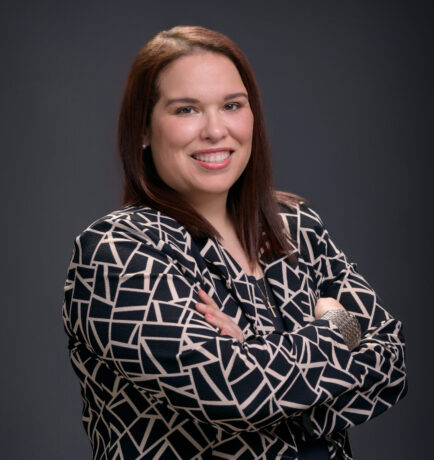
Reflecting on the insights presented in the Lake Institute article titled “Nurturing Generosity within Hispanic/Latinx Communities,” three words resonate strongly: resilience, opportunities, and hope. Having participated in the April gathering, I can personally attest to its profound significance, which was both a bold undertaking and a reaffirmation of our shared values. The conversations were bold, as many in society often overlook these critical discussions, yet affirming, as we could once again confirm that our community’s history is rich with diverse expressions of generosity. In a context where our contributions may often go unrecognized, the dialogues from this gathering highlighted the resilience of our Hispanic community – a resilience that transcends mere financial giving. We embody a form of generosity that is frequently unquantified, yet its impacts are undeniably tangible and vital for the advancement of mission-making and shared values. Our strengths lie in our creativity and steadfast commitment to viewing generosity as a lifestyle. By acknowledging the social capital rooted in our community’s generous spirit, we can cultivate a deeper understanding of how these values contribute to meaningful kingdom-building efforts.
Our history of generosity within Hispanic communities underscores the importance to nurture this culture through ongoing exploration and continuous education. By developing educational resources and training programs we can equip our communities with practical tools and theological insights that align with our values and traditions. Intergenerational engagement is vital, allowing different age groups to share experiences and deepen our collective understanding of generosity. Collaborating with philanthropic organizations and establishing strategic partnerships offers a significant opportunity to enhance resources and expertise, creating a robust support network for meaningful initiatives. Establishing platforms, like the one we had last April, for ongoing dialogue is essential not only for maintaining momentum from the initial gathering, but also for fostering a vibrant community where ideas and best practices can thrive for us and by us.
I am certain that together we can establish ongoing holistic strategies to promote and enrich our culture of generosity, strengthening relationships, and ensuring that this vital way of living continuously flourishes among Latinos and Latinas. There is hope!
Rev. Jessica Lugo Meléndez, DMin, MBA, MDiv. is an educator, pastor and administrator. She is an ordained minister of the American Baptist Churches and active member of the pastoral body for the Puerto Rico Region. Jessica instructs postgraduate courses in History of Christianity, New Testament, and Evangelism, at the PR Theological Seminary and is also an adjunct faculty member at multiple Bible Institutes. Additionally, and thanks to technology, she imparts knowledge at several undergraduate Business Administration courses at various universities across the nation. Educational work is her passion, particularly within the younger generation of emerging leaders.
With over 20 years of combined ministerial and corporate experience, Dr. Lugo has written for various theological, ecclesiastical, and administrative publications. She holds a Doctorate in Ministry with a specialization in Biblical Teaching and Preaching from Liberty University. She also holds an MDiv from the Evangelical Seminary of Puerto Rico, a second Master’s in Business Administration with a concentration in Marketing from Ana G. Méndez University, and a Bachelor’s degree in Business Administration with a concentration in Accounting from the same university. Of all these credentials, Dr. Lugo insists that her most important title and calling is that of service.
Advance Your Research: Apply for the Lake Doctoral Dissertation Fellowship
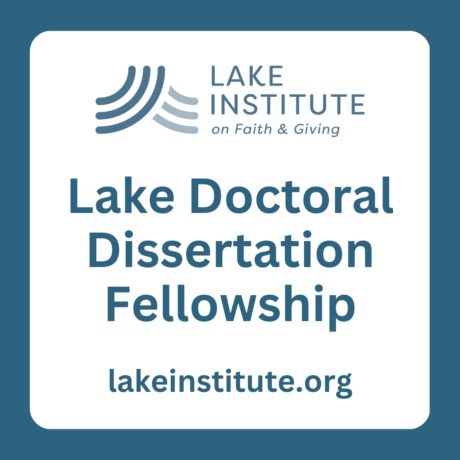
Calling all Ph.D. candidates! Are you researching the intersection of religion and philanthropy? The Lake Doctoral Dissertation Fellowship is here to support you! This one-year grant provides financial assistance, totaling $30,000, for your final year of dissertation writing. We are accepting applications now through January 17, 2025. Don’t miss the chance to elevate your research and connect with a vibrant community of scholars!
Allison Schnable, 2012 Lake Doctoral Dissertation Fellowship recipient (Princeton University), shares, “The fellowship was a tremendous boost to my studies. Their financial support allowed me to do field research in Africa and write a much stronger dissertation that I otherwise could have done. And my association with the institute has introduced me to a new network of practitioners and scholars. I’m very grateful for Lake Institute’s support of my work.”
For more details and to apply, visit our website.
Lake Institute Launches Resource Library for Philanthropy and Black Churches
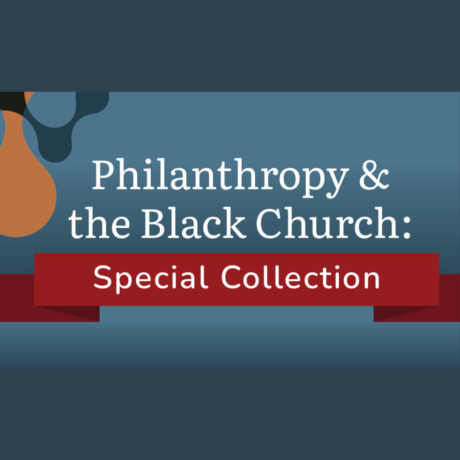
Discover the new Philanthropy and the Black Church digital library, a transformative resource from Lake Institute on Faith & Giving, developed in partnership with the Center for the Church and the Black Experience at Garrett-Evangelical Theological Seminary.
This comprehensive collection offers decades of trusted research, success stories, case studies, and strategic tools aimed at fostering meaningful partnerships between Black religious communities and philanthropic institutions. Whether you’re focused on social justice, community health, or empowerment, these insights provide the foundation for building trust-based, impactful relationships that can shape a more just and equitable future. Explore the library today and take the first step toward amplifying our collective power.
Subscribe
Insights is a bi-weekly e-newsletter for the religious community and fundraisers of faith-based organizations that provides:
- Reflections on important developments in the field of faith and giving
- Recommended books, studies and articles
- Upcoming Lake Institute events

